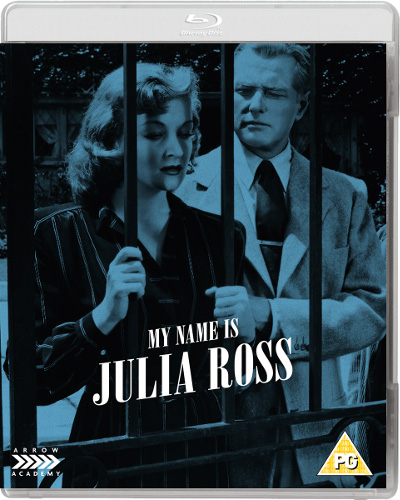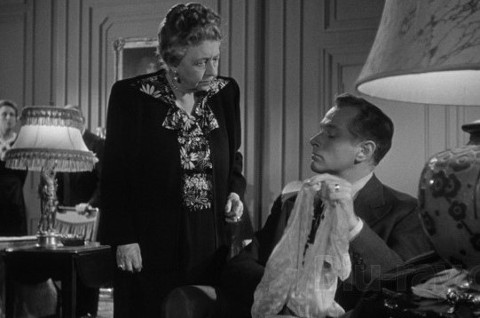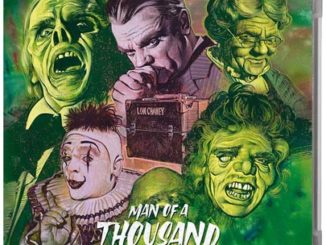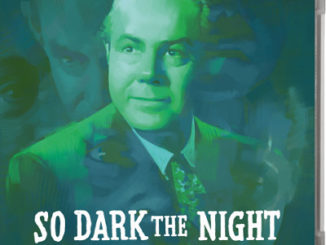My Name Is Julia Ross (1945)
Directed by: Joseph H. Lewis
Written by: Anthony Gilbert, Muriel Roy Bolton
Starring: George Macready, May Whitty, Nina Foch, Roland Varno
USA
AVAILABLE ON BLU-RAY from ARROW ACADEMY
RUNNING TIME: 65 mins
REVIEWED BY: Dr Lenera, Official HCF Critic

Julia Ross is a lonely woman living in London. She has no family except a sister in America and her potential suitor, Dennis, has just got married. Behind with her rent, she goes to a new employment agency and is recommended for a job as a live-in personal secretary to wealthy widow, Mrs. Hughes. After spending two days at the Hughes household, Julia awakes as a prisoner at an isolated seaside estate in Cornwall. All of her possessions have disappeared and she’s told that she’s really Marion, the wife of Ralph Hughes, Mrs. Hughes’s son, and that she’s suffered a nervous breakdown. Then things get worse when she tries to escape.…

The name Joseph H. Lewis may not be a familiar one to many, but he’s regarded by many film historians to be one of the masters of low budget thrillers and westerns during the ‘40s and the ‘50s, elevating them through tremendous visual style. I only saw one of his films for the first time a few months ago, his most famous work Gun Crazy, a stunning crime thriller which is basically a precursor to Bonnie And Clyde and in my opinion possibly even better [yes,l I think it’s that good] despite having been made for very little money. I thoroughly recommend it. Anyway, I promised myself that I would check out some of his other work but had failed to do so by the time Blu-rays from Arrow of two of his movies were posted through my letterbox, so their arrival couldn’t have been better timed. My Name Is Julia Ross, which was Lewis’s first notable work after toiling in what used to be known as ‘poverty row’ quickies, isn’t really in the same league as Gun Crazy – but then I didn’t expect to be. However, this blend of Gothic melodrama and film noir, which was probably influenced by Rebecca and Gaslight, and which was remade not just for TV in 1953 but also in 1987 as Dead Of Winter [which I haven’t seen], is still most definitely worth a look. There’s not an ounce of fat in its taut 65 minutes and the low budget, which ensured that sets had to be plain and small and that close-ups had to be often employed, really helps in providing a feel of nightmarish claustrophobia. The plot is pretty well constructed and we have a very gutsy, resourceful heroine to get behind too. Only some weak writing involving Julia and Dennis, and the final act, which seems very rushed, notably lets the side down.
We’re in London, and it’s totally pissing it down when Julia returns to her lodgings and reads a letter from Dennis. The two of them used to go out, but it doesn’t seem like it was serious, and Dennis is now getting married. However, he soon shows up in person to tell her the wedding is cancelled because he kept calling his fiancee Julia. The scene just doesn’t convince and the two leads don’t seem to have been convinced by it either as their acting isn’t great here. Never mind, the emphasis is on Julia as she’s behind on her rent and needs to get a job pronto, though she’s recently had an operation so she doesn’t want to do anything too strenuous [this is soon forgotten unsurprisingly]. She goes to this new employment agency and gets a job immediately – and it’s here where screenwriter Muriel Roy Bolton [and the writer of the original novel was a woman too, ‘Anthony Gilbert’ being a pseudonym] does something that will either annoy or surprise in a good way – she lets us know that Mrs. Hughes, her son Ralph and the interviewer – who’s actually one of the Hughes’s maids – are up to no good and even tells us quite a bit of what it is that they’re doing – though of course we don’t know why yet. The decision to go for suspense over surprise in the Hitchcock fashion may have been necessitated by the fact that there wasn’t really enough time for a gradual build-up of intrigue, but it works for me, especially the way that Ralph, who likes to sit there polishing his set of knives, could very well be psychotic. And let’s face it – Julia should have had a hunch that something was up when the owner of the house turned out to be May Whitty, the lady who vanished in The Lady Vanishes, though here it seems to be four people plus a employment agency that seem to have disappeared when Dennis starts investigating as to why Julia failed to make their appointment.
Julia has her bag emptied, her clothes ripped up [Ralph rather enjoys doing this too much], a photo of herself thrown into a fire. A whole identity destroyed. Julia wakes up a prisoner in a Cornish house by the sea, looking out of the window onto the waves and the rocks after which we cut to a long distance shot of the house atop the cliff, really ramming home the sense of isolation. The others try to convince her that she’s Ralph’s wife Marion while at night not just a cat but a human intruder seem to visit despite nobody seeming to be able to get into the room. There’s a nicely creepy Nosferatu-type shot of the shadow of a hand moving over her body, while it seems that Ralph may have been violent towards her too when they forced tea [possibly with something else in it] down her, even though we don’t see this. However, despite being understandably terrified, she doesn’t waste time sitting around and crying and instead tries to escape any way that she can, but she’s foiled every time and any other people she does encounter either don’t believe her or could be in on the act too. And we gradually find out more and more of what’s really going on. Although there’s one rather too convenient letter which is slightly sticking out so that it can be seen and therefore have the plot advanced, the story is generally handled pretty well until the last 15-20 minutes where it almost seems to like a few pages of the script had been torn out. One important scene involving a letter [letters are very important indeed in this tale] appears to finish before it’s played out properly, and a climax on a beach, while strikingly shot, is over rather too quickly. Some timing seems absurdly contrived too, and let’s not dwell on the rather glib, overly happy, finale. Nevertheless the whole thing is still reasonably cohesive and I failed to spot any major plot holes.

A few weak line readings betray the rushed nature of the shooting, but in general everyone fares pretty well. Nina Foch, whom old school horror fans will remember from The Return Of The Vampire and Cry Of The Werewolf though who was mostly known as a supporting actress and later an acting coach, gives quite a ‘modern’ style, natural performance in this film, she’s able to run subtly through a gamut of emotions without once going over the top, while George Macready was already adept at his polished villain act. He’s quite scary when his eyes bulge, something that could have looked silly. The whole mother/son relationship has a very tense and interesting dynamic and you can see mother’s control gradually slipping throughout the course of the film. Elsewhere there’s quite a ‘lived in’ feel to the film, with even the few minor characters being given nuances and therefore making some impact. I especially liked the cleaner [familiar bit part actress of the period Doris Lloyd] who works in Julia’s boarding house, thinking that Julia’s a bit high and mighty and naughtily tearing up a letter [yes, another one] and pocketing some money meant for the landlady. Her presence provides a slight class element, while it’s interesting that the women in this film are often more capable than the men. It was a man’s idiocy that caused the need for this elaborate charade in the first place. There’s nothing remotely approaching feminist propaganda here, but I do think that having two female writers did give the film a certain slant missing from many similar films of the time, and which may help it play rather well today. By contrast, horror fans should find much to enjoy – there’s not only an influence from the Val Lewton chillers of the time, but the ghost of Edgar Allan Poe here and there, notable when the cry of the imprisoned [and black] cat leads Julia to a hidden passageway.
The cinematographer from Burnett Guffey continually emphasises the presence of closed doors, barred windows, elaborate fences, and imprisoning shadows. He only gradually brings in the noir style, but by the time Julia narrowly misses falling to her death at a time when it seems that the house itself seems to be changeable, we’re watching this kind of photography at its very best, with faces often partly covered in black and pools of darkness all over the place. There’s lots of camera movement too, often uniting both exteriors and interiors – at one point, the camera even seems to move through a wall. Meanwhile close-ups are often just slightly ‘off’, and even dissolves between scenes tend to be rather artistic. Economy dictated that dialogue scenes sometimes rely on one over-the-shoulder shot – but it works, notable when all we see is Foch’s expressive eyes. One gets a sense of Lewis trying everything he could to enhance the proceedings despite being very pushed for time. It’s therefore a shame that the musical score by Mischa Bakaleinikoff is just average. Despite having a rather depressing feel in places it’s not detrimental to the film even when it’s plastered over scenes which don’t need it, but it fails to match the skill and hard work done by many others on this picture.
While I do feel that My Name Is Julia Ross could have done with an extra ten minutes or so towards the end, its meagre running time certainly doesn’t stop it from being a rewarding watch, and it may make you wonder why so many films have to be so long. Most of the Universal horrors were of a similar length. Granted, Martin Scorsese did say something to the effect that a bad film is always too long and a good film is never long enough, but I’d like to see a return to this kind of length, at least in ‘B’ movies, many of which today seem to suffer from obvious padding just so the film can run nearer the 90 minute mark. Anyway, My Name Is Julia Ross, poor in budget [$175 000!] but rich in look and feel and all-round involvement, is a neat little thriller.
Arrow’s Blu-ray of My Name Is Julia Ross, taken from a restoration by Sony, boasts fine contrast, deep blacks and strong detail. It’s sometimes slightly flickery, and some of the dissolves look rather rough, but the latter was probably to be expected. Overall it’s still a good presentation. This seems to be the first time that this film has had any special features of note, and Arrow offer first an audio commentary by film noir expert Alan K. Rode. Please don’t be put off by the early stages, where it’s obvious that Rode is reading from notes, gets very biographical, and leaves long gaps separated by comments on what’s happening on screen. The track improves, and, while Rode doesn’t really analyse the film in any detail, he offers some very good observations, while debunking some of the things Lewis – who was obviously prone to exaggeration – has said about his movies. This is followed by Identity Crisis: Joseph H. Lewis at Columbia which offers an excellent look at the film, the early career of Lewis, and a description of how the film fits into a cycle of movies of the time that channel the anxiety of women who, after being given some measure of independence during World War 2, were pressured back into domesticity. She even offers a favourable interpretation of the last scene. I hadn’t heard of Nora Fiore aka the Nitrate Diva before, but a quick visit to her website [if you’re into the old stuff have a look at https://nitratediva.wordpress.com/ ] revealed a perceptive and loving writer of reviews of old movies, and I hope we hear from her again on an Arrow Blu-ray.
Short, sharp and sinister – My Name Is Julia Ross casts quite a spell for most of its length, meaning that Arrow’s Blu-ray comes Recommended.
SPECIAL EDITION CONTENTS:
*High Definition Blu-ray (1080p) presentation
*Original uncompressed mono PCM audio
*Optional English subtitles for the deaf and hard-of-hearing
*Commentary by noir expert Alan K. Rode
*Identity Crisis: Joseph H. Lewis at Columbia – The Nitrate Diva (Nora Fiore) provides the background and an analysis of the film [23 mins]
*Theatrical trailer
*Reversible sleeve featuring original and newly commissioned artwork by Scott Saslow
FIRST PRESSING ONLY: Illustrated collector’s booklet featuring new writing on the film by author and critic Adrian Martin








Be the first to comment